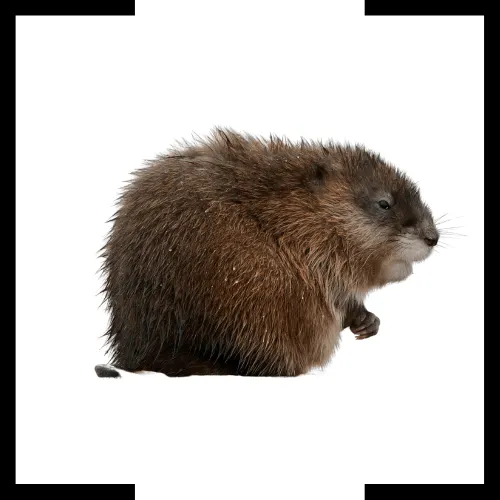Muskrat Removal & Control
Nuisance animal populations, including the muskrat, have been steadily on the rise in Missouri. More and more homeowners are experiencing conflicts with these pint-sized, problematic pests, so if you have been having an issue with them lately, you are not alone.
Muskrats are destructive, semi-aquatic rodents. Given their name, you might assume they are a rat type, but they are not. Despite their strikingly similar, albeit smaller appearance, they are not even that closely related to beavers. (They can grow a couple of feet and about 4 pounds, whereas an older beaver can tip the scale past 100 lbs.) They are members of the more diminutive family Cricetidae, which includes voles, mice, and hamsters. Also, they were not even called “muskrats” originally. They were called musquash, then musk-beaver, until they finally settled into their present moniker.

Muskrats are found in the same wetland habitats (lakes, ponds, streams, etc.) that beavers and river otters frequent, including freshwater and saltwater environments. They are the most bad-tempered, territorial, aggressive, and likely to bite of the three species. They carry the same parasites and diseases as other rodents, with tularemia the greatest concern.
Muskrats are primarily herbivores, although they sometimes eat small fish, clams, and snails. Their favorite foods include cattails, water lilies, rushes, and wild rice, but virtually no plant is off their menu. They eat the entire plant, roots, leaves, stems, fruits, and all, and their appetite is non-stop. They are furry little eating machines infamous for destroying foliage and the marshy habitats of other animals like waterfowl. In a commercial setting, they can decimate entire crops. None of the plants in your landscape are safe from their attention in residential areas. Muskrats are also tunnel, lodge, and burrow builders, and their extensive digging activities frequently jeopardize the banks of ponds and other bodies of water.
If you live within approximately 150 feet of a body of water or have one on your property, no matter how small, you could be a target. Between the damage they do, the diseases they spread, and their overall aggressiveness, this is one rodent you do not want anywhere near your home or business. If you suspect muskrat activity, please keep your distance and seek professional help immediately.
Throughout Missouri, there is one standout, trusted name in professional wildlife removal, and that’s Advanced Wildlife Control. We are renowned for our prompt and efficient responses, humane methods, and extensive services, including wildlife removal and remediation, cleanup, repair, and exclusion work. If you need assistance with a nuisance population of muskrats or have an issue with other intrusive wildlife, please do not hesitate to contact us. We are here and ready to help.
